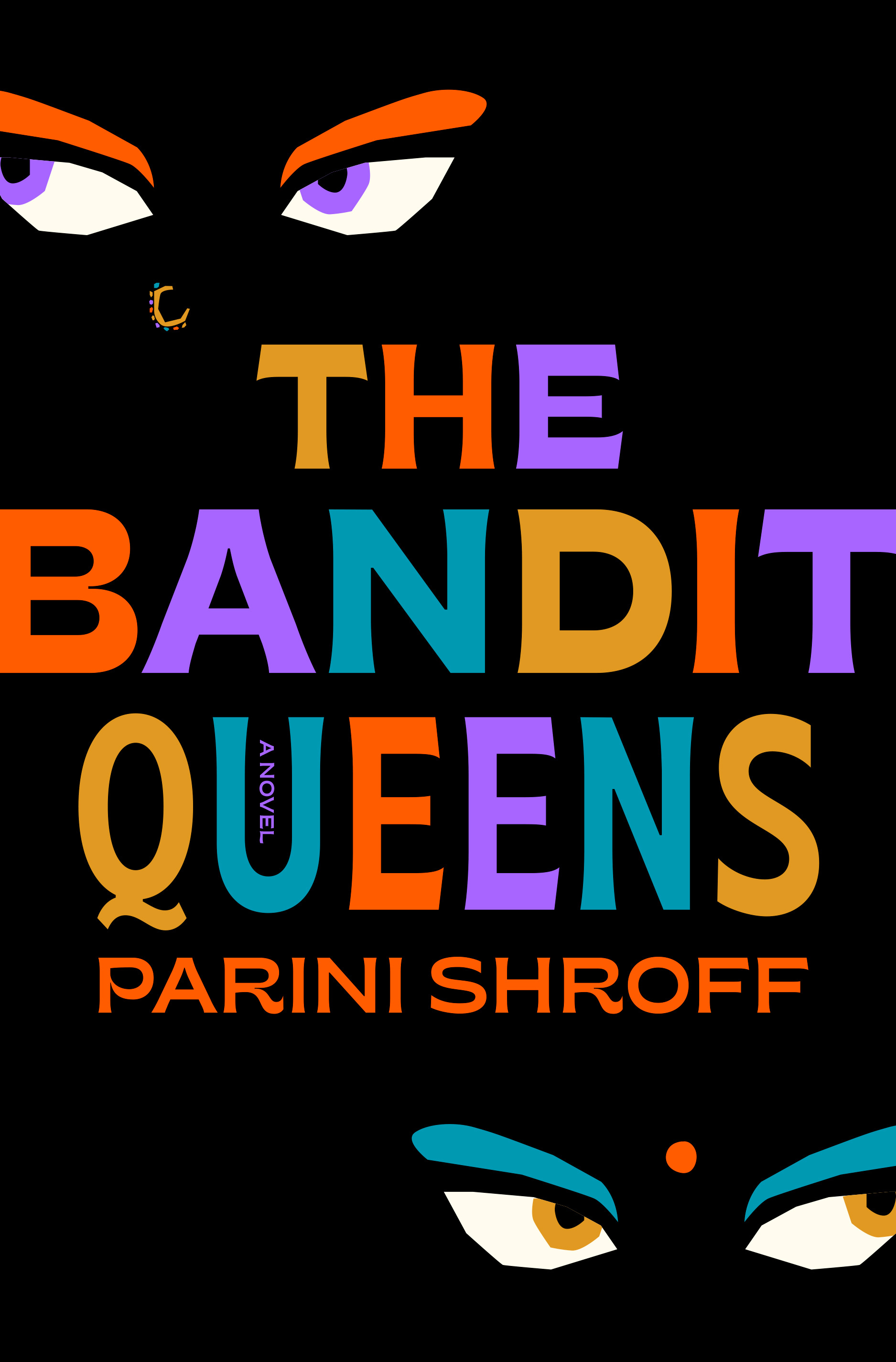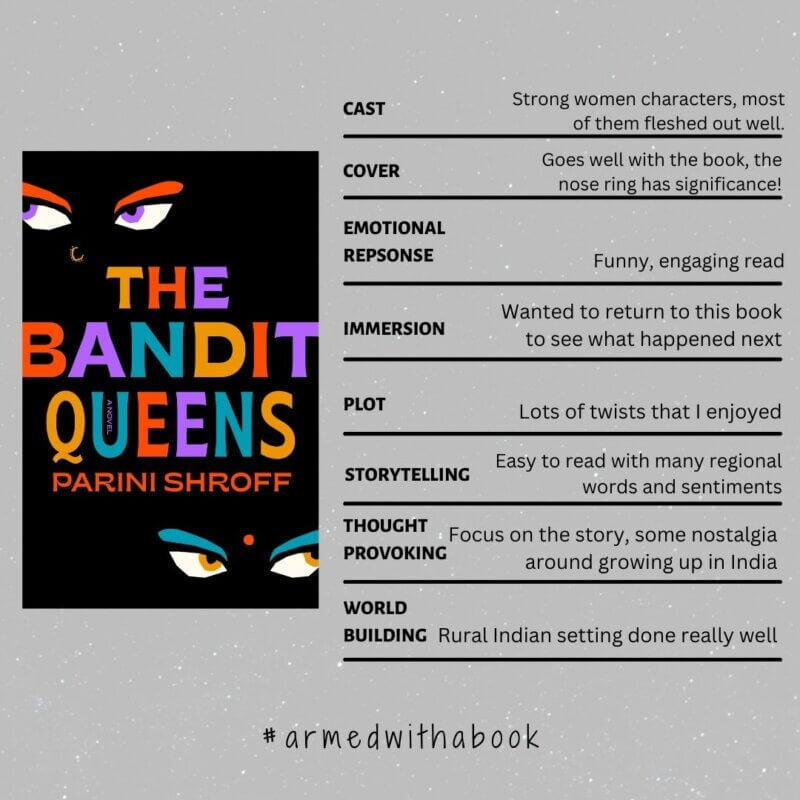“When did everyone in this village get so casual about murder?” If you are looking for an authentic story set in India, full of the colors, customs, traditions, societal expectations and slurs, there is no better book to pick thanThe Bandit Queens. Take a look at the synopsis:

The Bandit Queens
By Parini Shroff | Goodreads
Geeta’s no-good husband disappeared five years ago. She didn’t kill him, but everyone thinks she did–no matter how much she protests.
But she soon discovers that being known as a “self-made” widow has some surprising perks. No one messes with her, no one threatens her, and no one tries to control (ahem, marry) her. It’s even been good for her business; no one wants to risk getting on her bad side by not buying her jewelry.
Freedom must look good on Geeta, because other women in the village have started asking for her help to get rid of their own no-good husbands…but not all of them are asking nicely.
Now that Geeta’s fearsome reputation has become a double-edged sword, she must decide how far to go to protect it, along with the life she’s built. Because even the best-laid plans of would-be widows tend to go awry.
Content notes include domestic abuse, murder, sexual assault, alcoholism, animal cruelty.
The Bandit Queens – Review
Set in a village in India, the protagonist, Geeta, has been shunned by fellow villagers ever since her husband disappeared five years ago. Some believe her to be a cunning witch who killed her husband, someone capable of devouring their kids and cursing anyone who displeases her, while most people aren’t that superstitious but they continue to keep their distance.
Geeta as a protagonist
Geeta has had a lonely existence since Ramesh left but her seclusion from the community started long before that. As the story of The Bandit Queens unravels, I get insights into who Geeta used to be when Ramesh was around. In the present time, she makes mangalsutras, auspicious jewellery for married women. She took out a loan with some other women of the village and every week, they meet the bank official to return a small part of the money they had borrowed. When one of the women asks Geeta to help her kill her husband like she killed Ramesh, Geeta feels wanted and agrees to be an accomplice in murder.
She is not a perfect character and that is why she is a great protagonist! She is quirky and a nervous wreck in parties and social events. As she starts to interact more with the women in the loan group and gets to know them better, she realizes that her misery when Ramesh was around has not been lost on these women. Yet they did nothing about it. She decides to help the women who want her to be their guide in murder but at the same time the irony is not lost on her:
“If women could help each other commit murder because they felt morally right, then why couldn’t they help others being wronged, too?”
As Geeta starts to step out of the shell that she has built around herself, she starts to gather the courage to speak up.
The World of The Bandit Queens
The world of The Bandit Queens has numerous layers and I want to touch on four of them here.
# 1 The position of women in society
The rural India setting offers a lot of contrast from modern urban living. Women are not eligible to take loans by themselves. They can get together and take a group loan. Their business is often seen as a hobby by the rest of their family.
Life is such that even when they are abused by their husbands, they don’t say anything. Other women see the marks on their bodies but choose to ignore it. It is a household/personal issue, nothing an outsider, even a friend, can get involved in.
In the loan group that Geeta is part of, Saloni, in particular, is someone Geeta was close to when she was young but somehow Ramesh ended that friendship and Saloni has kept Geeta at arm’s length. I liked this perspective of being close, drifting apart and becoming close again. The Bandits Queen is a great example of female friendships and camaraderie that develops in the time of need for these women.
# 2 Motherhood
As the only single woman in the loan group, Geeta is often reminded that she neither has a husband nor any kids in her household. Women are often seen as the reason they are unable to conceive and Geeta not having kids is seen as her failing rather than having anything to do with Ramesh.
Between complaining about their children and the unexpected ways in which their bodies have changed due to bearing them, the general consensus amongst the other women in the loan group is that being a mother is a privilege and the hardships are just another side to the joys of motherhood. They are allowed to complain but it should not be taken seriously. They are always downplaying the reality that they experience and this is not lost on Geeta.
# 3 The caste system
Segregation by religion and caste has been an integral part of Indian living, stretching into the times before the British ruled India. Phoolan Devi, a real-time Indian figure revered by Geeta was Dalit, as is Khushi, the woman who is in charge of taking away and cremating dead bodies in the village. In the village that Geeta calls home Dalits, previously known as untouchables, are still limited to certain areas and jobs. There aren’t many Muslims who live in the village.
I liked how The Bandit Queens integrated the caste system and challenged it through the narrative. Even though laws have been passed to represent the disadvantaged members of society (women and Dalits) on prestigious village boards, it was interesting to note how much of it was for show and how the characters in the book ultimately started using this to their advantage.
# 4 Phoolan Devi, the inspiration
In modern Indian history, Phoolan Devi is a renowned figure. Popularly known as the Bandit Queen, she was a dacoit who later became a Member of Parliament, before being assassinated. She went through many hardships in life at the hands of men and later extracted her revenge by killing many of them. She served her time in jail and went to take a prominent position in politics. She was a Dalit girl, a nobody, who stood up for herself and became someone. Her story is an inspiration to many women, including Geeta and I remember her from my childhood. I liked seeing her tied into contemporary literature like this one! Such a great idea!
Little Details I loved
I enjoyed the many references to movies and tv shows that I grew up on. Kuch Kuch Hota Hai was the first movie I ever watched in theatres and CID was the first crime show I ever watched.
Another reason I liked this book is because of the community that is portrayed. People in villages are close, everyone knows everything and everyone, and seeing how the kids were part of the action was nice.

Overall, The Bandit Queens is a fun read. I see it as a satirical piece and hence, certain plot choices didn’t always come off as realistic to me, and that is to be expected in satire, the hyperbole of situations. Sometimes it felt like the book was trying to do too much through the sheer number of characters and their background. Maybe it was too educational around the atrocities that women can face in villages but that could also be the reality in a community that isn’t well educated and still so divided in gender roles and practices.
Keeping all that in mind, I would encourage you to read this book if you can dispel some belief and if
- You want to learn more about how to get away with murder
- You want to explore the moral reasons to justify murdering a husband
- You love a story where a stray dog gets a forever home
Thanks for reading my review! 🙂 Find this book on Goodreads.

Be First to Comment